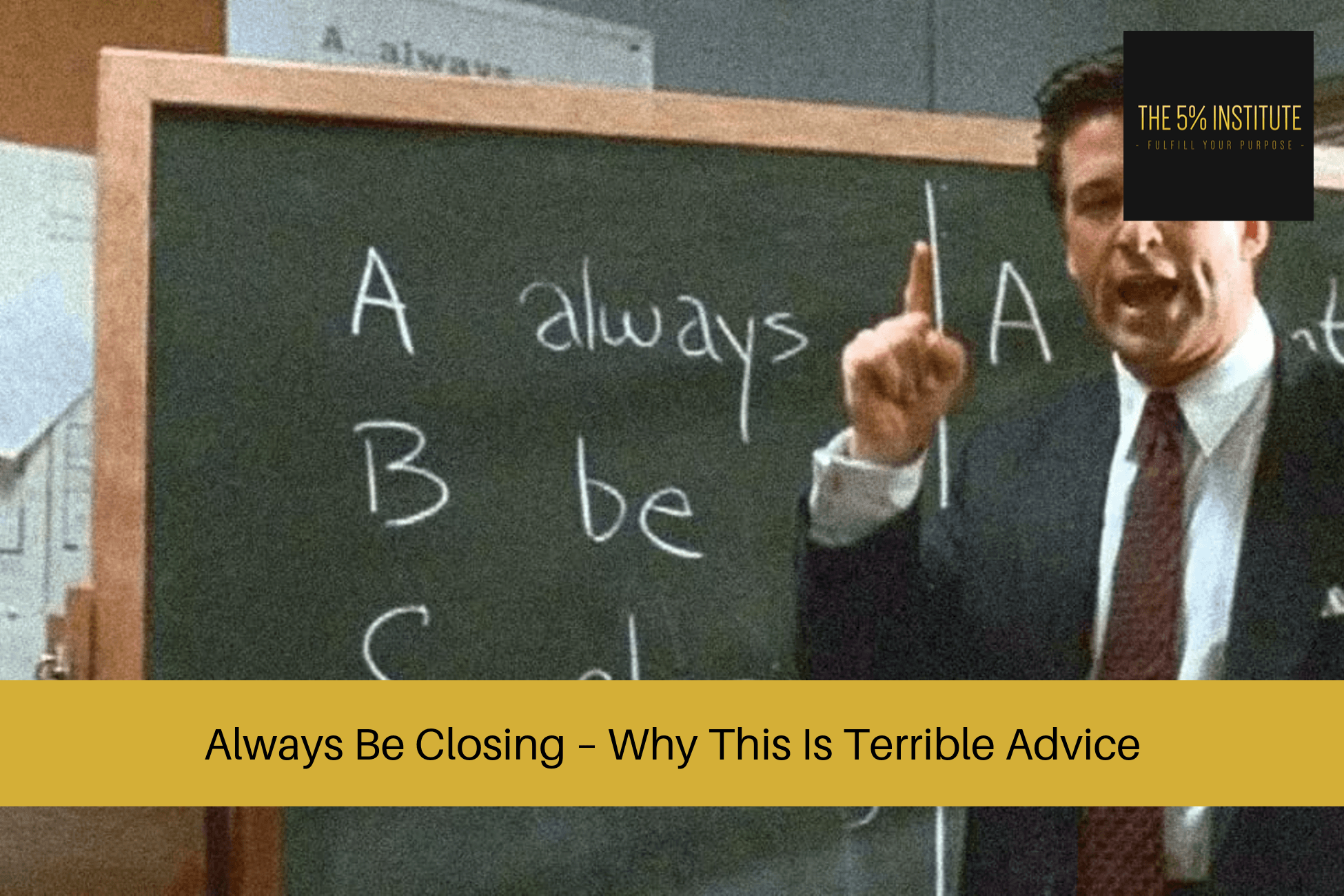
Always Be Closing – Why This Is Terrible Advice
Always be closing – a phrase made famous by the 1984 movie Glengarry Glen Ross, is a popular term is high pressure sales teams all around the world.
Also known by the acronym ABC, always be closing means you should always have the intent for closing your prospects and potential clients every step of the way.
Everything in your sales efforts and sales process, should be focused on closing the person in front of you (or of course, on the phone).
But is this good advice?
Can the popular always be closing ‘advice’ actually be harming your sales efforts and results instead?
In this article, you’ll learn why always be closing is not just poor advice – but in fact terrible if you want to be successful in sales.
Read on to learn why.
Always Be Closing – Why This Is Terrible Advice
Always Be Closing – What If It’s The Wrong Prospect?
The pressure to turn prospects into newly signed and enrolled clients within many organisations is common practice. The focus is put on you, your pipeline, and how many deals and hand shakes you secure that month.
What is often missed though, is are you wasting your time with the wrong person?
First of all, is this person the right prospect for your offer? Do they actually qualify for your products and services?
If you’re focused on the practice ‘always be closing’, you’ll be wasting both yours and their time having the sales conversation; and trying to sell them a product or service that they don’t even qualify for.
Can they afford it? Are they the right buyer persona for this kind of offer?
People who follow the always be closing mindset spend too much time speaking with people who have no fit for your product or service.
When you factor in the hours in a year on how much time is spent with unqualified people, you’ll have a dim understanding of why so many Sales Professionals struggle – and why always be closing is harming their efforts.
Will They Benefit From Your Product Or Service?
Contrary to what a lot of Sales Trainers teach out there; we teach something a little different.
And that is that you should only sell something to your prospects that they will truly benefit from.
Being an order taker or going in with an always be closing mindset is contrary to the belief that you should come in with a mindset of truly serving a person with your product or service, because it makes the sale purely about yourself.
If the sale is truly about yourself – then it is being selfish.
Selfish people don’t do well in sales in the long run – and if you’re reading this article, you’re probably planning to be in this game long term and want to be successful at it too.
People with the mindset of always be closing generally build some rapport, prematurely pitch their products, and then use hard closing tactics and techniques to win the deal.
This sales methodology is ancient and is no longer efficient in today’s marketplace.
When serving your potential clients, the sale should always be a win – win result.
This is what good selling is.
When both parties succeed, you both stay in business longer. They’re happy and will more than likely give you referrals. You’re happy, because you walk away with a new client who can give you referrals, and perhaps buy again and again; increasing the value of your customer.
It’s just better business.
The always be closing mindset robs you of that potential.
Always Be Closing Makes You Less Educated
With the always be closing mindset and approach, your focus is on:
- Pushing & pitching
- Making statements about why your product or service will be beneficial, and why they should buy.
As we’ve already detailed, this is counter productive because you don’t know if they’re qualified, and you wouldn’t know if they would actually benefit at all – you’re making assumptions.
Furthermore – people who follow the always be closing mantra are less educated, in that they make more statements and ask less questions.
When someone is more interested is selling their products or services, they pitch more and are always presenting why their product is the right fit for their prospect, or the business they work at.
When someone is presenting to you; you have a choice to either believe it or not. It’s like playing roulette; it’s a 50/50 chance.
Instead when you ask open ended questions, get the potential client speaking about
- Their situation
- Pain points
- Desires
- Why they’re basically speaking with you in the first place
This way, you put yourself in an excellent position to win the sale and truly serve that prospect.
When you prematurely present, you lose this opportunity.
Sales success is reserved for those who speak less and listen twice as much.
What Should You Do Instead?
I hope this article has shed some light on why always be closing can actually harm your sales. So now that you know this, what do you do instead?
The answer is in three parts.
Use A Sales Process
When speaking with potential clients, you need to be using a consistent sales process that gives them certainty, and you a road-map that you can follow to win more sales.
If you’re winging it with your sales approach, you’ll naturally fall back into pitch mode; and the always be closing mindset out of sheer desperation.
When you’re using a sales process, you’ll feel a lot more comfortable because you’ll know what you should be doing right now, and exactly what you should be doing next.
Our flagship program teaches this step by step system. You can learn more by clicking here.
Use Open-Ended Questions
Open-ended questions are excellent, and a tool used widely by the most successful Sales Professionals and Business Owners.
Asking great questions positions you in a manner opposite to that of the high pressure and the always be closing approach.
This is because it sets the framework of getting your potential client to speak and open up, versus pitching them and hoping something will stick.
Doing this gives you the information you need to present to them later, when you have all the information you need to do a specific and tailored presentation.
Help Them Sell Themselves
Instead of always be closing – always be asking questions that helps them sell themselves.
When you’re presenting and pitching, there’s a chance they’ll believe you, and a chance that they won’t.
When you ask great questions and they expand on it, it’s real to them – because they said it!
Why? Because it’s their belief, meaning it’s real to them.
A great way to help people sell themselves, is a combination of all three – an excellent and structured sales approach, open ended questions, and using tie downs.
To learn more about tie-downs, check out the related article below.
Related article: Tie Down Sales Techniques – Your Ultimate Guide
Final Thoughts
Always be closing; although famously known and practised, is a poor strategy and mindset for the model Sales Professional.
Instead, use a more consultative sales approach, focusing on these three key areas:
- Mastering your sales process
- Becoming a wizard at asking great open-ended questions
- Using tie downs to help people sell themselves
If you want to learn about putting this all together and much more, you can do so by joining the 7 day sales challenge here.
Want To Close Sales Easier?
Are you committed to closing sales a lot easier, and consistently?
If so, you should check out our self-paced and affordable online sales training program; The 5% Sales Blueprint.
It’ll give you everything you need to close sales consistently.
To learn more, simply click on the link below for more information.
Our Online Sales Training Program – The 5% Sales Blueprint.



